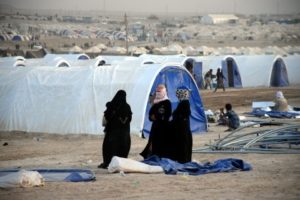by WorldTribune Staff, June 22, 2016
While the battle for Fallujah, which Iraq had prematurely declared liberated, continues, survivors are telling harrowing stories of their escape from the brutal rule of Islamic State of Iraq and Levant (ISIL).
Food supplies in Fallujah were low for months, with the city besieged by security forces and bombarded with artillery and airstrikes. ISIL gunmen routinely shot at those fleeing.

One survivor, Falah Hussein Ali, showed media the deep bruises from where he said he had been whipped with electric cables. Ali said he was in an ISIL prison when the operation to liberate Fallujah began and he now is in an overcrowded displacement camp with insufficient water, food, shelter and medical care.
“We didn’t want [ISIL] there,” he said. “But they brought us from one death to another kind of death. What kind of life is this?”
Meanwhile, a U.S. military commander in Baghdad contradicted Iraq’s claim that it had driven ISIL out of 80 percent of Fallujah. Col. Christopher Garver said Iraqi forces had cleared only a third of the city and the rest remains contested.
ISIL jihadists have barricaded themselves in residential neighborhoods in the north of the city and Garver warned that Iraqi troops would encounter more resistance as they moved out from the city center.
“What it looks like is (an ISIL) defensive belt around the city with not as stiff defenses inside. That could be their toughest fighting.”
Ghassan Abou Chaar, an emergency coordinator for Doctors Without Borders, said that the toll in the camps is both physical and mental. “People are at breaking point,” he said.
Adding to the stress for families is that all men of fighting age are detained for security screening, leaving women and children alone until male family members are released.
“If the government can’t help us, they should at least release our men,” said one woman from the Mualimin neighborhood of Fallujah. “We ran away from Daesh, from the bombing, from the hunger, and we find this.”
More than 83,000 people have fled Fallujah since the government launched the assault and up to 25,000 more are likely to be on the move, according to the UN.
